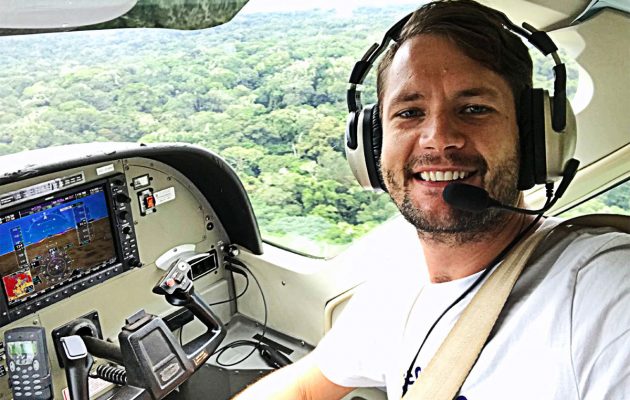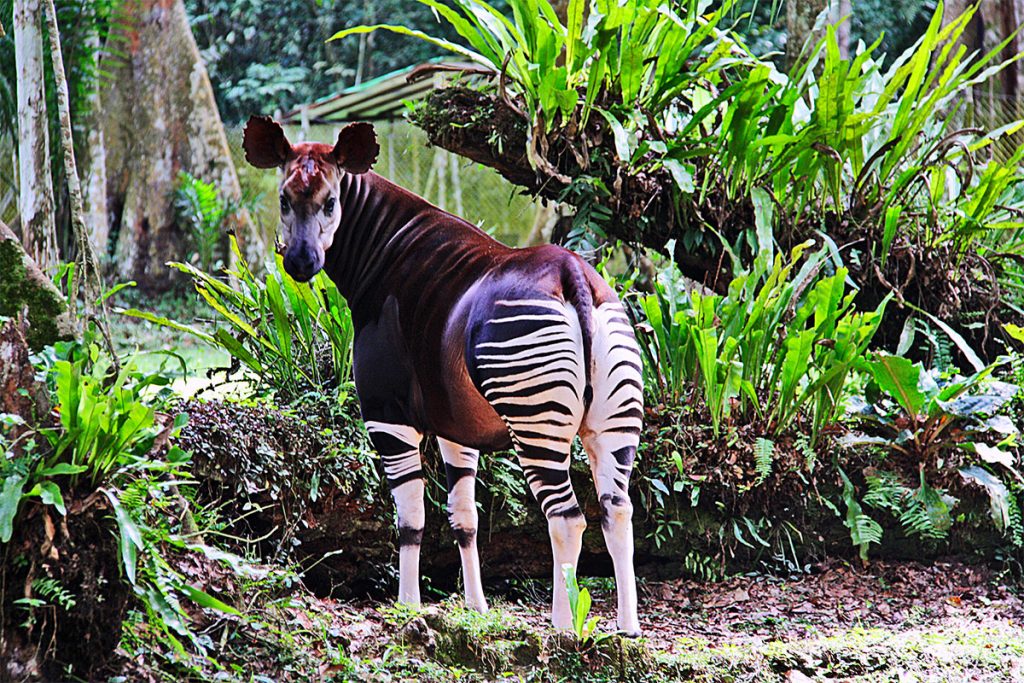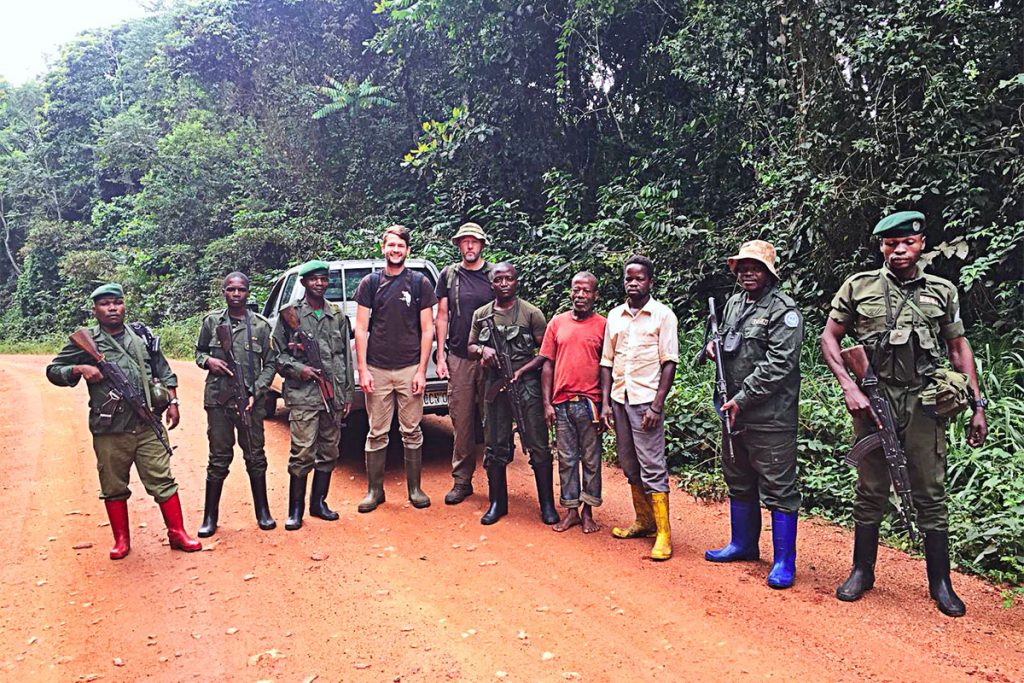Camera trapping the coolest animal you’ve never heard of

Lakewood resident seeks to save endangered okapi in Africa
Okapi. That’s “the coolest animal you never heard of,” according to Lucas Meers, a Lakewood man who hunts the mammal in the Congo. He longs to trap and shoot them—with a camera, that is.
The okapi is the cultural symbol of the Democratic Republic of the Congo (DRC), like the bald eagle is to the United States. Each okapi has its own unique stripe pattern, like a human fingerprint, which allows blending into the shafts of light created by the dense tree canopy of the tropical rain forest.
Because of okapis’ striped coats, many people mistakenly think they are zebras’ relatives, but that’s not so. They actually make up a species of their own and are, evolutionarily, the oldest living relatives of giraffes, although not discovered by Western scientists until 1901. This is due, in part, to the okapi’s highly reclusive nature. In fact, Meers has not yet had the opportunity to see one in the wild except on camera trap. He enjoys spending time though with the one currently living at the Jacksonville Zoo and Gardens (JZG).

It’s his role as Program Officer for the Okapi Conservation Project (OCP) that has thrice brought Meers to the heart of Africa, the Congo, the location of the Okapi Wildlife Reserve, an over-5,000-square-mile area where OCP is based. The organization’s mission is to save and to bring awareness of this extraordinary mammal, now endangered due to the impact of human activities like deforestation, poaching, and mining.
Meers’s most recent trip to the DRC in late 2019 was spent with a staff of 35 focused on planning end-of-year programs, setting up 2020’s budget, making sure the forest is protected, and celebrating World Okapi Day on October 18, which annually centers around fun activities like parades, soccer games, and races, combined with educational messaging. “Another interesting component to the visit was the complications of navigating the effects and impact of Ebola and the general instability and insecurity in the region due to rebel groups,” noted Meers.

The Project has established “a balance between people and the environment,” Meers said. In their attempts to rescue the okapi from extinction, OCP did not want to expel the indigenous people from their villages; so, they live inside the Reserve with distinct zones designated for farming of crops and hunting of certain species. Coordinated programs teach farmers crop rotation strategies, and community assistance supports healthcare centers and schools throughout the Reserve, which has increased the standard of living in and around the okapi habitat.
A leading proponent of these efforts is JZG, employing Meers in a unique hybrid position. Half of Meers’s work hours are involved with the OCP. Although a separate organization, part of the Zoo’s contribution to the project is allowing Meers not only to participate in field expeditions but also to use office space at the Zoo for OCP administrative functions.
The other half of Meers’s working hours are spent on JZG’s conservation efforts; this includes protecting animals as well as plants because, as Meers pointed out, they “are very interconnected.” He has a hand in sending staff to fields, educating guests, and developing a speaker series. Meers is endeavoring to make the Zoo a conservation resource for the entire Southeastern region of the United States.
In addition to his role with the Okapi Conservation Project and his employment at the Zoo, Meers has volunteered for nearly a decade with the Mickler’s Landing Turtle Patrol, part of the Florida Fish and Wildlife Conservation Commission’s Marine Turtle Research and Management program. The group patrols beachfront, collects trash, records data, protects nests, and reports violations.
The lure of the beaches initially brought this midwestern Saint Louis boy to Florida and to Jacksonville University, where Meers dual majored in biology and marine science. Although suggested to him by some, he didn’t want to study veterinary medicine. Meers preferred to be in the field. “Being outside is my Zen,” he said. It’s where he finds his peace.
After graduation, Meers couldn’t bring himself to leave the area. While living in Neptune Beach, he began his employment at JZG in a fundraising capacity and then shifted to an interim role as the Zoo’s coordinator of special events and public relations before making his way in May 2016 to the conservation department.
On Dec. 30, 2019, Meers was proud to announce the three-year anniversary of owning his home in Lakewood, a neighborhood he and his wife “fell in love with” after witnessing the daily dog-walking and children-playing that mark its pulse. The live oak tree overarching his back deck and the 10 acres of woods abutting the backyard, which Meers often explores, prompt reminiscing about his own childhood.
As a boy, Meers spent many an afternoon wading in a creek, collecting turtles, snakes, and crawdads, which he’d bring home as specimens to study and friends to cherish. “I’ve always been drawn to animal life, always distracted by birds,” he admitted.
In high school, before AP science classes were offered on the curriculum, Meers convinced his guidance counselor to make an exception to a rule and allow him to take the AP bio exam. He scored high. There was no doubt that Meers was meant to work with animals and that someday his vision would come to pass.
Lucas Meers, “lover of all things science” as his Twitter profile points out, is passionate about animal conservation and educating the public. When most American boys are asked what they want to be when they grow up, Conservation Program Officer working with wildlife rangers and indigenous people of Africa is not high on their list. But for Lucas Meers, the 32-year-old who describes himself as “outdoorsy,” that title has him living his dream. His days in the creek back in Saint Louis seem to have prepared him well for his current career. “I’ve always had a vision of working with animals,” he said. And he’s doing just that, right here in Jacksonville.
By Mary Wanser
Resident Community News




 (6 votes, average: 4.67 out of 5)
(6 votes, average: 4.67 out of 5)

